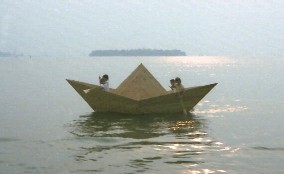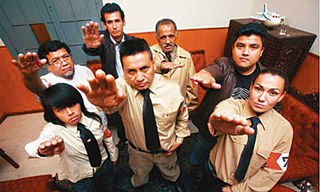Iquitos, Peru
“Iquitos or Bust!”
Iquitos is a city in the eastern part of Peru, or to be specific, smack-dab in the middle of the Amazon jungle. It is a tourist Mecca, or would be except that the national government cannot get interested enough to build a highway to connect it to the rest of the country. However, it can be reached by air from Lima on one of the few aircraft that has what it takes to get over the Andes and has enough left afterwards for a smooth landing.
Residents of Iquitos (iquiteños) compare the city favorably to Hong Kong, as Iquitos also has water on all sides (and usually above). It reminds tourists from the U.S. of Hawaii — at least those old enough to remember the aftermath of the attack on Pearl Harbor.
History[edit]
Spain, near the end of its ill-fated conquest of the Americas, very graciously gifted the lands to the Portuguese, French, English, Americans, Germans, Taliban, and so on. The Portuguese in turn passed it on to a certain other mediocre Spaniard, hoping for him to die of malaria. But he arrived at a small plains, where they say Adolf Hitler is buried, and here at the location of modern-day Iquitos, he founded a town called San Pablo de Nuevos Napeanos, discovering just before dinner that the native Napeanos were cannibals.
Eventually the Spaniards found a slightly more vegetarian band of natives called Iquitos. Gradually, the Napeanos got annoyed because there was only one bathroom and the Iquitos seemed to spend all day in it.
Finally, around the time of the Inquisition, the Napeanos, Iquitos, and Europeans got better table manners and started living like Westerners. After Peru gained its independence, basically nothing changed except that war with Spain was replaced by more convenient wars with Colombia, Ecuador, and Brazil, all of which had designs on the Amazon jungle. Ecuador was getting tired of its ample frontage on the Pacific Ocean and longed to use the great Amazon River as a back door to the Atlantic Ocean. Given that Brazil could already get out to the Atlantic that way, it is unclear why it wanted the territory, as there is little point going upstream. Colombia, for its part, merely wanted acreage on which to grow coca that the United States would not think of bombing with herbicides.
The people[edit]
The majority of people in Iquitos are a unique mix of monkey and Nazi (pictured) who fled Europe and took refuge in the jungle. There is also a small minority of normal people, who mostly stay indoors in the evenings with the shades drawn.
The population is intrinsically so hard-working that they love to procrastinate, as putting off anything to tomorrow carries the promise of having even more desire to work. This is especially true if, like any good Peruvian, they decide to spend today at the nearest bar knocking back a few beers.
The hallmark hobby of the region, in those rare cases when hunger overcomes thirst, is to stand underneath a coconut tree and wait for lunch to fall.
Though Iquitos is perfectly Catholic, its patron saint is the Hindu monkey god Hanuman (pictured). Local Catholicism is seasoned, like Indian food, with an excess of hallucinations of demons, phantasms, and your naked old lady. Tourists can become equally devout after smoking a little of the signature farm crop of Iquitos.
The various migrations of invasive human species to Iquitos have given rise to antisocial subgroups, from Ecuadoreans to fans of Reggaeton. In recent years, Muslims, otakus, and bronies have followed, and what harm could come of that? The first arrivals crossed the Napo river, fleeing beloved president Rafael Correa in cargo ships along with pairs of other animal varmints. Following them were Brazilians, coming up the Amazon in similar cargo ships, as Peru's southern neighbor respects life and preserves it, in tuna fish cans, so as not to have problems with Peru.
Infrastructure[edit]
Iquitos is noted for beautiful homes with holes and without roofs. These local adaptations let the heat enter the home, for the feel of the Sahara Desert but with drenching rains every day.
The streets likewise have holes and no roofs. A pedestrian amusement, for pedestrians, is to dodge bottomless pits in the pavement. This is a gift of regional president Hon. Ivan Velásquez, who is always re-elected, thanks to the same amnesty-inducing voting booths employed throughout Peru that resulted in a second chance for García to become President and see if he could wreck the currency again.
If there were highways to the rest of Peru, then there might be utility poles beside the highways, and it might be possible to surf the Internet using high-speed dial-up modems, except in times of mudslides and high terrorist activity.
See also[edit]
| This page was originally sporked from Inciclopedia. |



